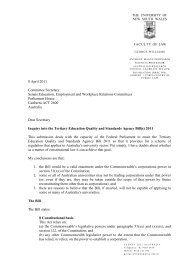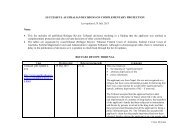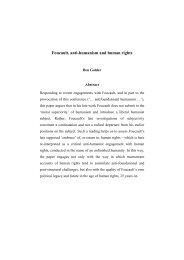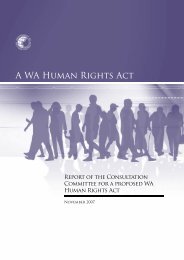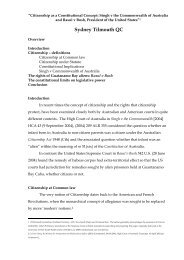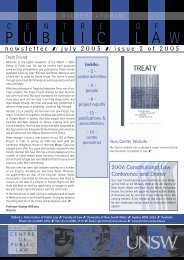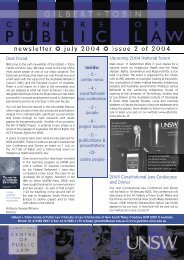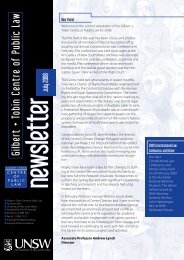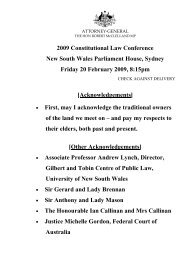Dummy Template - Customised LetterHead - Gilbert + Tobin Centre ...
Dummy Template - Customised LetterHead - Gilbert + Tobin Centre ...
Dummy Template - Customised LetterHead - Gilbert + Tobin Centre ...
You also want an ePaper? Increase the reach of your titles
YUMPU automatically turns print PDFs into web optimized ePapers that Google loves.
THE UNIVERSITY OF<br />
NEW SOUTH WALES<br />
FACULTY OF LAW<br />
GEORGE WILLIAMS<br />
ANT HO NY M ASON P R O F E S S OR<br />
S C I EN T IA P R O F ESSOR<br />
AUS TRALIAN R ES EARC H<br />
C OUNC I L LA UREAT E FE LLO W<br />
F OU NDA T I ON D IR EC TOR,<br />
G I LB ERT + T OB IN C EN TRE O F<br />
P UB LIC LA W<br />
27 May 2011<br />
Committee Secretary<br />
Joint Standing Committee on Electoral Matters<br />
Parliament House<br />
Canberra ACT 2600<br />
Dear Secretary<br />
INQUIRY INTO THE FUNDING OF POLITICAL PARTIES AND ELECTION<br />
CAMPAIGNS<br />
I make the following points based upon my earlier submission to the Government’s Electoral<br />
Reform Green Paper: Donations, Funding and Expenditure.<br />
At present, there are a myriad of problems that corrode public confidence in the political system<br />
and in those who serve in parliament. I support a comprehensive overhaul of electoral law as it<br />
relates to donations, funding and expenditure. Importantly, the reforms in each of these areas<br />
must reinforce each other to produce a system that operates in the best interests of Australian<br />
democracy and the Australian people. Electoral reform is needed to bring about a more<br />
effective and fair electoral system. The long term strength of Australian democracy depends<br />
upon such reforms.<br />
Reforms should be founded on the principle of transparency and disclosure and should include<br />
caps on donations and expenditure. Combined with restrictions on the use of funds for purposes<br />
like electronic advertising, this might mean that the current level of public funding will be<br />
sufficient, or near to sufficient.<br />
It is important that reforms are undertaken in a holistic manner. There is no point, for example,<br />
in capping donations if the expenditure side of the equation is not also dealt with. It is also<br />
important that the reforms do not merely amount to changes in legal regulation, but also have<br />
an impact upon the culture within political organisations. Australia needs to develop a system<br />
that has clear rules that direct political campaigning into more useful and appropriate channels,<br />
S Y D N E Y 2 0 5 2 A U S T R A L I A<br />
T e l e p h o n e : 0 2 9 3 8 5 5 4 5 9<br />
M o b i l e : 0 4 1 4 2 4 1 5 9 3<br />
g e o r g e . w i l l i a ms @ u n s w . e d u . a u
ut these rules by themselves will not be adequate unless they are backed by a clear<br />
understanding and recognition of their worth on the part of participants in the political process.<br />
When it comes to donations, non-residents should not be entitled to make monetary<br />
contributions to Australian political parties. Their involvement in this way has the capacity to<br />
distort the Australian electoral system and to provide an inappropriate outside influence on<br />
democratic decision making in Australia. I also favour placing a cap on donations, and perhaps<br />
even preventing donations from anyone other than individuals, but only on the basis of<br />
adequate public funding of political campaigning and expenditure caps on campaigning.<br />
I support a cap on the expenditure of funds on campaigning by political parties, candidates and<br />
other participants both in and outside of the formal election period. Proven expenditure should<br />
be the only basis upon which a person or party can receive public funding. It should be made<br />
clear that taxpayers’ funds relating to political campaigning can only be received where they<br />
can be matched to actual expenditure.<br />
One major concern lies in the demand for money in order to undertaken electronic and other<br />
forms of advertising. An attempt to limit such advertising was struck down in 1992 by the High<br />
Court in Australian Capital Television. The idea of limiting electronic advertising should be revisited.<br />
That High Court decision struck down a particular scheme that was found to be<br />
deficient in light of a freedom of political communication then implied from the Constitution.<br />
That was not an implication that was taken into account in the drafting of the legislation<br />
because at the time the law was drafted the implication had not yet been recognised.<br />
I believe that it would be possible to design a new scheme to limit electronic advertising that<br />
would be consistent with the constitutional implication. It is not, for example, clear (as is stated<br />
in para 10.20 of the first Electoral Reform Green Paper) that ‘a complete ban on election<br />
advertising would likely be unconstitutional’. This was not the finding of the High Court, and<br />
any judicial assessment would depend on matters such as the nature of the ban and the other<br />
avenues still available for political campaigning.<br />
Reform of electronic advertising should be undertaken because any cap on donations or<br />
expenditure is unlikely to be effective unless the demand for funds by political parties and<br />
candidates is also reduced. Other nations with more stringent limitations on freedom of speech<br />
and related political freedoms have proven capable of enacting limitations on advertising (and<br />
hence the demand of money) within the political system. They have recognised the clear<br />
imperative of regulating matters such as electronic advertising in order to produce a fair and<br />
open electoral contest that is not distorted by money. It is time that Australia again sought to go<br />
down this path.<br />
Yours sincerely<br />
George Williams



